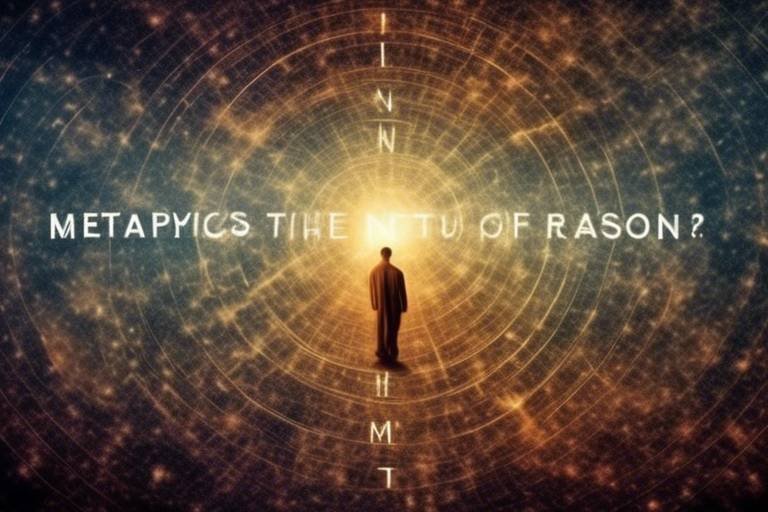The Importance of Ontology in Human Life
Ontology is more than just a philosophical term; it is a fundamental aspect of how we understand our existence, knowledge, and the reality that surrounds us. Imagine for a moment that you're trying to navigate a vast, uncharted territory. Without a map or a guide, you would be lost, unsure of where to step next. This is akin to the role of ontology in our lives; it provides the map that helps us navigate the complexities of existence and knowledge. In essence, ontology shapes our perception of reality, influencing everything from our philosophical inquiries to our scientific explorations and technological advancements.
At its core, ontology addresses some of the most profound questions we can ask: What does it mean to exist? What is the nature of reality? These questions are not merely academic; they resonate deeply in our everyday lives. For instance, when we categorize our experiences or define our beliefs, we are engaging in ontological thinking. This process helps us create meaning and structure in a world that can often feel chaotic and overwhelming.
Moreover, ontology has practical implications across various fields. In philosophy, it lays the groundwork for metaphysics, guiding discussions on the nature of being and existence. In science, it provides a framework for organizing knowledge, allowing scientists to categorize and interpret data effectively. In technology, particularly in artificial intelligence and information systems, ontology enhances our ability to manage and retrieve data, making it easier for machines to understand human concepts.
As we delve deeper into this article, we will explore the multifaceted role of ontology in shaping our understanding of existence, knowledge, and reality. We will examine its historical roots in philosophy, its applications in science, and its critical importance in the digital age. By the end of this discussion, it will become clear that ontology is not just a theoretical construct; it is a vital component of human life that influences how we interact with the world and each other.
- What is ontology? Ontology is the philosophical study of being and existence, exploring the nature of reality and what entities exist.
- Why is ontology important? Ontology helps us understand the structure of reality, categorizing knowledge and influencing various fields, including philosophy, science, and technology.
- How does ontology relate to technology? In technology, ontology is crucial for organizing data, enhancing machine understanding, and facilitating better information retrieval.

Understanding Ontology
Ontology is a fascinating field that delves into the very essence of being and existence. It’s not just a dry academic term; rather, it’s a profound inquiry into what it means to exist, what entities populate our reality, and how we categorize these entities. Imagine ontology as the lens through which we view the world; it shapes our understanding of everything from the simplest objects to the most complex concepts. When we ask ourselves, "What is real?" or "What does it mean to exist?" we are engaging in ontological questioning.
The origins of ontology can be traced back to ancient philosophy, where thinkers like Plato and Aristotle laid the groundwork for this discipline. They explored fundamental questions about reality, such as the nature of objects and their properties. For instance, Plato introduced the idea of Forms, which posited that non-material abstract forms represent the most accurate reality. Aristotle, on the other hand, focused on substance and its attributes, providing a more tangible approach to understanding existence.
Throughout history, ontology has evolved, adapting to the changing landscape of philosophical thought. In the modern era, it intersects with various fields, including metaphysics, information science, and even computer science. This evolution reflects our ongoing quest to understand the complexities of existence. It’s like peeling an onion—each layer reveals deeper insights into the nature of reality, prompting us to reconsider what we think we know.
In addition to its philosophical roots, ontology plays a crucial role in the realm of science. It serves as a framework for organizing knowledge, providing a structured approach to categorizing information. For example, in biology, ontologies help classify living organisms, while in information technology, they enable better data management. The interplay between ontology and science illustrates how fundamental these concepts are to our understanding of the world.
Moreover, ontology is not merely a theoretical construct; it has practical implications in our daily lives. Consider how we use language to communicate ideas. The way we define terms and categorize concepts is inherently ontological. For instance, when we talk about emotions, we might group them into categories like positive and negative. This categorization helps us navigate our experiences and share our feelings with others, highlighting the relevance of ontology beyond academic discussions.
In summary, ontology is more than an abstract philosophical concept; it is a vital part of our quest for understanding existence. It influences how we perceive reality, shapes scientific inquiry, and impacts our everyday interactions. As we continue to explore the depths of ontology, we uncover layers of meaning that enrich our understanding of what it means to be alive in this complex world.

Ontology in Philosophy
Ontology, the branch of philosophy that delves into the nature of being and existence, plays a pivotal role in shaping our understanding of reality. It raises profound questions that have intrigued thinkers for centuries: What exists? What does it mean for something to exist? These questions are not merely academic; they influence how we perceive our world and ourselves. From ancient philosophers like Plato and Aristotle to contemporary theorists, ontology has evolved, yet its core inquiries remain relevant today.
In the realm of philosophy, ontology is not just a standalone discipline; it intertwines with other philosophical branches such as metaphysics and epistemology. While metaphysics deals with the fundamental nature of reality, ontology hones in on the categorization of entities that populate that reality. This distinction is crucial because it allows philosophers to dissect and understand the very fabric of existence. For instance, consider the debate between realism and nominalism, which questions whether universals exist independently of the objects they describe. This debate is a classic example of how ontological discussions can lead to significant implications in various fields, including ethics and logic.
Throughout history, several key figures have made substantial contributions to ontology. For example, Immanuel Kant revolutionized the field by proposing that our understanding of reality is shaped by our perceptions and cognitive structures. He argued that while we can never truly know the "thing-in-itself," our experiences are filtered through our senses and intellect, thus shaping our understanding of existence. This perspective opened doors to new discussions about the limits of human knowledge and the nature of reality itself.
Exploring the historical perspectives on ontology reveals a fascinating journey through time, showcasing how ancient and modern thinkers have approached the concept of being. In ancient Greece, philosophers like Plato posited the existence of ideal forms—abstract representations of objects we encounter in the physical world. Plato's Theory of Forms suggests that non-material abstract forms, and not the material world, possess the highest and most fundamental kind of reality. In contrast, Aristotle offered a more empirical approach, focusing on substance and essence. His emphasis on categorizing entities laid the groundwork for future ontological inquiry.
As we moved into the modern era, the landscape of ontology transformed. The rise of existentialism, spearheaded by thinkers like Jean-Paul Sartre and Martin Heidegger, introduced a more subjective view of existence. They argued that existence precedes essence, meaning that individuals must create their own meaning in a world devoid of inherent purpose. This shift not only challenged traditional ontological views but also paved the way for discussions about personal identity, freedom, and responsibility.
Furthermore, analytic philosophy emerged as a significant movement in the 20th century, focusing on language and logic. Philosophers like Bertrand Russell and Ludwig Wittgenstein emphasized the importance of linguistic clarity in ontological discussions. This approach led to a more rigorous examination of the terms and concepts used in philosophical discourse, ultimately refining how we articulate and understand existence.
In conclusion, ontology in philosophy serves as a cornerstone for exploring the essence of existence. From ancient theories that laid the groundwork for metaphysical inquiry to modern existential and analytic perspectives, ontology continues to challenge and inspire our understanding of reality. By grappling with the fundamental questions of what it means to exist, we not only enrich our philosophical discourse but also deepen our comprehension of the human experience.
- What is ontology? Ontology is the philosophical study of being and existence, exploring what entities exist and their nature.
- How does ontology differ from metaphysics? While ontology focuses specifically on the categorization of entities, metaphysics deals with the fundamental nature of reality as a whole.
- Who are some key figures in ontology? Notable philosophers include Plato, Aristotle, Immanuel Kant, Jean-Paul Sartre, and Martin Heidegger.
- What role does ontology play in modern philosophy? Ontology influences various philosophical discussions, including ethics, logic, and the nature of knowledge.

Historical Perspectives
Exploring the on ontology provides a fascinating glimpse into how the concept of being has evolved over time. From the ancient philosophers who laid the groundwork for metaphysical inquiry to modern thinkers who challenge and redefine existence, each era has contributed uniquely to our understanding of ontology. The journey begins in ancient Greece, where philosophers like Plato and Aristotle introduced foundational ideas that continue to resonate in contemporary discussions.
Plato's theory of forms suggested that beyond our tangible world, there exists a realm of ideal forms or essences. He believed that the physical world is but a shadow of this higher reality, emphasizing that true knowledge comes from understanding these forms. Aristotle, on the other hand, took a more empirical approach. He argued that substances are the primary entities, and he categorized them into various classifications, laying the groundwork for future ontological discussions.
As we move through history, the Middle Ages saw a fusion of Greek philosophy with religious thought, particularly within the works of Thomas Aquinas. Aquinas integrated Aristotelian ontology with Christian theology, suggesting that existence itself is a reflection of divine creation. This period emphasized the importance of existence in relation to a higher power, influencing how beings were understood in a metaphysical context.
The Enlightenment brought about a seismic shift in thought, with philosophers like René Descartes and Immanuel Kant questioning the very nature of existence. Descartes famously declared, "I think, therefore I am," highlighting the role of consciousness in establishing existence. Kant introduced the idea that our understanding of reality is shaped by our perceptions, suggesting that while we can know phenomena, the noumena—the things-in-themselves—remain elusive.
Fast forward to the 19th and 20th centuries, where existentialism emerged as a significant philosophical movement. Thinkers like Søren Kierkegaard and Jean-Paul Sartre emphasized individual existence and personal experience, arguing that existence precedes essence. This perspective shifted focus from abstract forms to the lived experience of being, challenging traditional ontological frameworks.
In the realm of analytic philosophy, figures such as Bertrand Russell and W.V.O. Quine contributed to the discourse by emphasizing logical analysis and language's role in understanding existence. Quine's rejection of the distinction between analytic and synthetic truths opened up new avenues for ontological inquiry, suggesting that our understanding of existence is deeply intertwined with linguistic constructs.
Thus, the historical perspectives on ontology reveal a rich tapestry of thought, where each philosopher has added layers of complexity to our understanding of existence. From the ideal forms of Plato to the existential musings of Sartre, these contributions continue to influence contemporary discussions in ontology, metaphysics, and beyond.
- What is ontology? Ontology is the philosophical study of being and existence, exploring what entities exist and their nature.
- Who are some key figures in the history of ontology? Significant figures include Plato, Aristotle, Thomas Aquinas, René Descartes, Immanuel Kant, Søren Kierkegaard, and Jean-Paul Sartre.
- How does ontology relate to science? Ontology provides a framework for categorizing knowledge, helping to structure scientific theories and data.
- Why is ontology important in technology? In the digital age, ontology enhances data interoperability and improves machine understanding of human concepts, particularly in AI and the Semantic Web.

Ancient Philosophers
When we think about the roots of ontology, we can't overlook the profound contributions made by ancient philosophers. These thinkers, particularly Plato and Aristotle, laid the groundwork for our understanding of being and existence. Their ideas are not just relics of the past; they continue to echo through the corridors of modern philosophy, shaping discussions in metaphysics and epistemology even today.
Plato, with his theory of Forms, proposed that the physical world is merely a shadow of a higher, unchanging reality. He argued that the essence of all things exists in this realm of Forms, where concepts like beauty, justice, and equality reside in their purest forms. This notion prompts us to ask: Are we merely experiencing a reflection of true reality? Plato's allegory of the cave illustrates this idea beautifully, suggesting that most people live in ignorance, perceiving only shadows of the truth. In his view, ontology is not just a study of existence; it’s a quest for a deeper understanding of what it truly means to exist.
On the other hand, Aristotle took a more empirical approach. He rejected Plato's abstract Forms, insisting instead that substance is the primary category of being. For Aristotle, everything that exists is a composite of form and matter, and understanding the essence of a thing requires examining its purpose or function—what he called "telos." This perspective laid the foundation for much of Western philosophy and science, as it encouraged a systematic study of the natural world. Aristotle's ontology, with its focus on categorizing entities based on their characteristics, is akin to creating a detailed map of existence, allowing us to navigate the complexities of reality.
To give you a clearer picture of their contributions, here’s a quick comparison:
| Philosopher | Theory | Key Concept |
|---|---|---|
| Plato | Theory of Forms | Essence vs. Appearance |
| Aristotle | Substance Theory | Form and Matter |
These ancient philosophers not only shaped the discourse of ontology but also influenced various fields such as ethics, politics, and science. Their inquiries into the nature of existence compel us to reflect on our own lives and the world around us. Just as a sculptor chisels away at marble to reveal the statue within, these thinkers have helped us peel back the layers of reality to uncover the essence of what it means to be.
As we delve deeper into the significance of ontology, we realize that the questions posed by these ancient philosophers are as relevant today as they were thousands of years ago. They challenge us to consider the nature of our existence and the framework through which we understand the universe. In a world increasingly dominated by technology and rapid change, revisiting these foundational ideas can provide clarity and insight into the complexities of modern life.
- What is ontology? Ontology is the philosophical study of being, existence, and the nature of reality.
- Why are ancient philosophers important in ontology? Ancient philosophers like Plato and Aristotle laid the foundational concepts that continue to influence modern philosophical thought and scientific inquiry.
- How does Plato’s theory of Forms relate to modern philosophy? Plato’s theory suggests that the physical world is an imperfect reflection of a higher reality, prompting ongoing debates about the nature of existence and perception.
- What was Aristotle's contribution to ontology? Aristotle introduced the concept of substance, emphasizing the importance of form and matter in understanding the essence of things.

Modern Developments
In the landscape of philosophy, modern developments in ontology have ushered in a wave of fresh perspectives that challenge traditional notions of existence. The 20th century marked a significant pivot with the rise of existentialism, where thinkers like Jean-Paul Sartre and Martin Heidegger emphasized the subjective experience of being. They argued that existence precedes essence, suggesting that individuals create their own meaning in an otherwise indifferent universe. This radical shift not only reshaped philosophical discourse but also influenced various fields, including psychology and literature.
Another pivotal movement is analytic philosophy, which emerged as a response to the complexities of language and meaning. Figures such as Bertrand Russell and Ludwig Wittgenstein focused on the clarity of language and its role in shaping our understanding of reality. They posited that our ontological commitments should reflect the way we talk about the world, leading to a more rigorous examination of the terms we use when discussing existence. This analytical approach has had profound implications for the development of logic and the philosophy of science, establishing a framework that prioritizes precision and clarity.
Moreover, the integration of scientific advancements into ontological discussions has sparked intriguing debates. For instance, the advent of quantum mechanics has challenged our conventional understanding of reality. The notion that particles can exist in multiple states simultaneously invites questions about the nature of existence itself. How do we reconcile these scientific insights with our philosophical inquiries? This intersection of science and ontology represents a rich area of exploration, pushing boundaries and inviting new interpretations.
Furthermore, contemporary ontology has expanded into the realms of social ontology, which examines the nature of social realities and collective entities. Thinkers like John Searle have contributed to this field by analyzing how institutions, such as governments and corporations, exist and operate based on collective human agreement. This perspective emphasizes that our social constructs are as significant as physical entities, reshaping our understanding of existence in a social context.
In summary, modern developments in ontology reflect a dynamic interplay of philosophical thought, scientific inquiry, and social constructs. Each movement builds upon the last, creating a rich tapestry of ideas that continue to evolve. As we navigate through these complexities, it's clear that ontology remains a vital area of study, inviting us to question the very foundations of existence and our place within it.
- What is ontology? Ontology is the philosophical study of being and existence, focusing on what entities exist and their nature.
- How does ontology relate to science? Ontology provides a framework for categorizing knowledge, helping scientists structure theories and data effectively.
- Who are some key figures in modern ontology? Major figures include Jean-Paul Sartre, Martin Heidegger, Bertrand Russell, and John Searle, each contributing to our understanding of existence in unique ways.
- What is social ontology? Social ontology examines the nature of social realities and collective entities, emphasizing the importance of social constructs in our understanding of existence.

Ontology in Science
Ontology plays a crucial role in the realm of science, serving as a foundational framework that helps scientists categorize and understand the vast array of knowledge they encounter. Think of ontology as the underlying architecture of a building; without it, the structure would be chaotic and unstable. In science, ontology provides a systematic way to define and organize various entities, their properties, and the relationships between them. This organization is essential for creating coherent scientific theories and ensuring that data can be effectively communicated and utilized.
One of the primary ways ontology contributes to science is by facilitating the development of scientific models. These models are essentially representations of reality, and ontology helps clarify what components are needed to accurately depict a phenomenon. For instance, in biology, ontological frameworks can categorize organisms based on various criteria such as taxonomy, genetics, and behavior. This categorization not only aids in understanding but also enhances communication among researchers, allowing them to share findings without ambiguity.
Moreover, ontology is indispensable in the field of data management. With the exponential growth of data in scientific research, having a robust ontological structure allows scientists to organize and retrieve information efficiently. It enables the creation of ontologies that define specific domains, ensuring that everyone in a particular field has a common understanding of the terms and concepts being used. For example, the Gene Ontology project provides a standardized vocabulary for gene functions, which helps researchers across different labs and studies to communicate their findings more effectively.
To illustrate the impact of ontology in science, consider the following table that outlines key areas where ontology plays a significant role:
| Area of Science | Role of Ontology |
|---|---|
| Biology | Facilitates taxonomy and gene function categorization. |
| Physics | Defines fundamental entities and their interactions. |
| Social Sciences | Organizes concepts related to human behavior and societies. |
| Computer Science | Enhances data interoperability and knowledge representation. |
As we delve deeper into the intricacies of ontology in science, it becomes evident that it is not merely a theoretical construct but a practical tool that shapes our understanding of the world. By providing a structured approach to categorizing knowledge, ontology ensures that scientific inquiry remains coherent and meaningful. It bridges the gap between complex theories and practical applications, allowing scientists to build upon each other's work without losing sight of the bigger picture.
In conclusion, ontology is not just an abstract concept confined to philosophy; it is a vital part of scientific practice that enhances our ability to explore, understand, and communicate about the universe we inhabit. As we continue to advance in various scientific fields, the importance of ontology will only grow, solidifying its place as an essential component of our quest for knowledge.
- What is ontology in science?
Ontology in science refers to the systematic categorization of entities, their properties, and relationships, which helps scientists to create coherent theories and manage data effectively. - How does ontology improve scientific communication?
By providing a standardized vocabulary and framework, ontology ensures that researchers can share findings without ambiguity, facilitating collaboration across different studies and fields. - Can ontology be applied to all scientific disciplines?
Yes, ontology can be applied across various scientific disciplines, including biology, physics, social sciences, and computer science, enhancing understanding and data management in each field.

Technology and Ontology
In today's digital landscape, the intertwining of technology and ontology has become more crucial than ever. As we navigate through an increasingly complex world filled with data, the need for structured frameworks to categorize and understand this information has surged. Ontology provides a blueprint for organizing knowledge, ensuring that both humans and machines can communicate effectively and comprehend the underlying meaning of data.
At its core, ontology in technology serves as a semantic foundation that enables various systems to share and interpret information seamlessly. Think of it as a common language that allows different software applications to talk to one another without misunderstandings. This is especially important in fields like artificial intelligence and data science, where the ability to interpret complex human concepts accurately can make or break a project.
One of the most significant advancements driven by ontology is the development of the Semantic Web. This concept revolutionizes how we interact with information online. By utilizing ontological structures, the Semantic Web enhances data sharing and retrieval, making it easier for users to find relevant content. Imagine searching for information and receiving results that not only match your keywords but also understand the context and intent behind your query. This is the power of ontology in action!
Moreover, ontology enhances data interoperability. In a world where data is generated at an unprecedented rate, having systems that can work together is essential. Ontologies provide a shared vocabulary and set of concepts, allowing different databases and applications to integrate smoothly. For instance, in healthcare, various systems can share patient data more effectively, leading to improved patient care and outcomes.
In the realm of artificial intelligence, ontologies play a pivotal role in knowledge representation and reasoning. They enable machines to not just process data but to understand it. By defining relationships between different concepts, ontologies help AI systems make informed decisions. For example, in a customer service chatbot, ontology allows the bot to comprehend the nuances of human language, improving its ability to assist users effectively.
To further illustrate the importance of ontology in technology, consider the following table that highlights some key applications:
| Application | Description | Benefits |
|---|---|---|
| Semantic Web | A framework that enhances data sharing and retrieval on the internet. | Improved search results and context-aware information. |
| Data Interoperability | Facilitates the integration of different data systems. | Streamlined processes and enhanced collaboration. |
| Artificial Intelligence | Helps machines understand and interpret human concepts. | Better decision-making and user interaction. |
In conclusion, the synergy between technology and ontology is not just a trend; it’s a necessity in our data-driven age. As we continue to explore and innovate, understanding the importance of ontology will be key to unlocking new possibilities in how we interact with the digital world. Whether it’s enhancing AI capabilities or improving data sharing across platforms, ontology stands at the forefront of technological advancement.
- What is ontology in technology?
Ontology in technology refers to the structured framework that categorizes and defines concepts within a specific domain, facilitating better communication and understanding between systems. - How does ontology improve data interoperability?
By providing a shared vocabulary and set of concepts, ontology allows different systems to integrate and communicate effectively, leading to more efficient data sharing. - What role does ontology play in artificial intelligence?
Ontology enables AI systems to understand complex human concepts, improving their ability to process information and make informed decisions.

Semantic Web
The is a transformative concept that elevates the traditional web into a realm where information is not just displayed but is also understood by machines. Imagine a web where data is interlinked and can be processed automatically, enabling computers to understand the meaning behind the data, much like humans do. This is not just a dream; it’s the reality that ontology helps create. By providing a structured framework for data, ontologies allow for a richer, more meaningful interaction with information online.
At its core, the Semantic Web relies on ontological structures to enhance data sharing and retrieval. It’s like giving the web a brain, enabling it to make connections between different pieces of information. For instance, when you search for a restaurant, the Semantic Web can help pull together data from various sources, such as reviews, menus, and even location services, to provide a comprehensive answer. This interconnectedness is crucial in a world overflowing with data, ensuring that the right information is not just available but also easily accessible.
One of the key components of the Semantic Web is the use of RDF (Resource Description Framework) and OWL (Web Ontology Language). These technologies allow for the creation of ontologies that define the relationships between various data entities. Think of it as building a map where every point has a clear connection to another, making navigation through information seamless. By employing these technologies, developers can create rich datasets that enhance user experience and improve search engine optimization (SEO).
Furthermore, the Semantic Web encourages the use of linked data, which is a method of publishing structured data so that it can be connected and enriched with other data. This means that when you click on a link, you’re not just accessing a single piece of information; you’re entering a network of related knowledge. This interconnectedness enhances the depth of information available, allowing for a more nuanced understanding of topics. For example, if you're researching climate change, linked data can connect you to studies, statistics, and even related environmental policies, providing a holistic view of the subject.
In summary, the Semantic Web represents a significant leap forward in how we interact with information online. By leveraging ontologies, it transforms the web from a simple repository of data into a dynamic, interconnected ecosystem of knowledge. As we continue to generate vast amounts of data, the importance of the Semantic Web will only grow, making it essential for businesses, researchers, and everyday users alike to harness its potential. In a world where information is power, being able to navigate and utilize that information effectively is more critical than ever.
- What is the Semantic Web?
The Semantic Web is an extension of the current web that allows data to be shared and reused across application, enterprise, and community boundaries by providing a common framework that allows data to be connected and understood.
- How does ontology contribute to the Semantic Web?
Ontology provides a structured framework for defining the relationships between different data entities, enabling machines to understand and process information more like humans do.
- What technologies are used in the Semantic Web?
Key technologies include RDF (Resource Description Framework) and OWL (Web Ontology Language), which facilitate the creation and sharing of ontological data.
- Why is linked data important?
Linked data allows for the connection of various datasets, enriching the information available and providing a more comprehensive understanding of topics.

Artificial Intelligence
Artificial Intelligence (AI) is revolutionizing the way we interact with technology, and at the heart of this transformation lies the concept of ontology. But what exactly does ontology have to do with AI? In simple terms, ontology provides a structured framework that allows machines to comprehend and process complex human concepts. Just as we use language to convey ideas and emotions, ontology serves as a language for machines, enabling them to interpret data in a meaningful way.
Imagine trying to explain a complicated recipe to someone who has never cooked before. You'd have to break down the ingredients, the steps, and the techniques involved. Similarly, AI systems require a clear understanding of the data they are processing. Ontologies help in defining the relationships between different entities, essentially acting as a map that guides AI through the vast landscape of information.
One of the most significant applications of ontology in AI is in knowledge representation. This involves creating a structured format that captures the essential information about a particular domain. For instance, in healthcare, an ontology might define relationships between symptoms, diseases, and treatments. This structured knowledge allows AI systems to make informed decisions, improving outcomes in fields like diagnostics and personalized medicine.
Furthermore, ontology enhances reasoning capabilities in AI. When machines understand the relationships and hierarchies of concepts, they can draw inferences and make predictions based on the information available. This is akin to how humans use their knowledge to solve problems or make decisions. For example, if an AI system knows that "all cats are mammals" and "whiskers are a characteristic of cats," it can infer that "whiskers are a characteristic of mammals." This level of reasoning is crucial for developing intelligent systems that can operate autonomously.
In the realm of AI, ontologies also play a vital role in interoperability. As technology evolves, systems must communicate with one another seamlessly. Ontological frameworks ensure that different AI applications can share and understand data without ambiguity. This is particularly important in industries like finance and healthcare, where data from various sources must be integrated to provide a comprehensive view.
Moreover, the integration of ontology in AI has led to advancements in natural language processing (NLP). By understanding the meaning behind words and phrases, AI can engage in more human-like conversations. For instance, virtual assistants like Siri or Alexa utilize ontological principles to comprehend user queries and provide relevant responses. This not only enhances user experience but also paves the way for more sophisticated interactions between humans and machines.
In summary, ontology is not just an abstract philosophical concept; it is a practical tool that empowers artificial intelligence. By providing a structured understanding of knowledge, ontology enhances AI's ability to reason, infer, and communicate effectively. As we continue to advance in the field of AI, the importance of ontology will only grow, shaping the future of technology and its integration into our daily lives.
- What is ontology in the context of AI?
Ontology in AI refers to a structured framework that defines the relationships between different entities, enabling machines to understand and process complex information. - How does ontology improve AI reasoning?
Ontology allows AI systems to draw inferences and make predictions by understanding the relationships and hierarchies of concepts, similar to human reasoning. - Can ontology help in natural language processing?
Yes, ontology enhances natural language processing by enabling AI to understand the meanings behind words and phrases, leading to more human-like interactions.
Frequently Asked Questions
- What is ontology?
Ontology is the philosophical study of being and existence. It investigates what entities exist and how they can be categorized and related within various fields such as philosophy, science, and technology.
- Why is ontology important in philosophy?
In philosophy, ontology is crucial because it shapes our understanding of reality. It addresses fundamental questions about existence, prompting discussions that have influenced major philosophical theories throughout history.
- How have ancient philosophers contributed to ontology?
Ancient philosophers like Plato and Aristotle laid the groundwork for ontology. Their theories on forms and substance have significantly shaped metaphysical discussions and continue to influence modern thought.
- What are some modern developments in ontology?
Modern developments include existentialism and analytic philosophy, which have redefined concepts of existence. These movements challenge traditional views and introduce new perspectives on the nature of reality.
- How does ontology impact scientific inquiry?
Ontology provides a framework for categorizing knowledge in science. It helps structure scientific theories and data, ensuring clarity and consistency in understanding complex concepts.
- What role does ontology play in technology?
In the digital age, ontology is vital for information systems and artificial intelligence. It enhances data interoperability and improves machine understanding of human concepts, making technology more intuitive.
- Can you explain the Semantic Web in relation to ontology?
The Semantic Web uses ontological structures to improve data sharing and retrieval online. By understanding the relationships between data, it enhances the web's capability to process information intelligently.
- How does ontology help in artificial intelligence?
Ontology aids in knowledge representation and reasoning within AI. It enables machines to interpret complex human concepts, which enhances their decision-making processes and overall effectiveness.



















